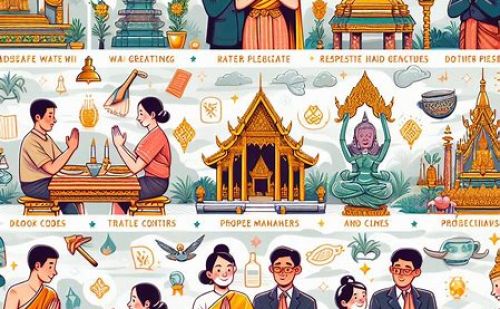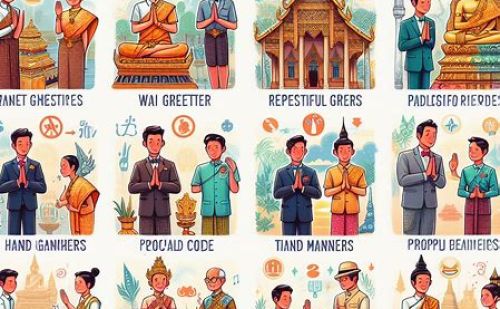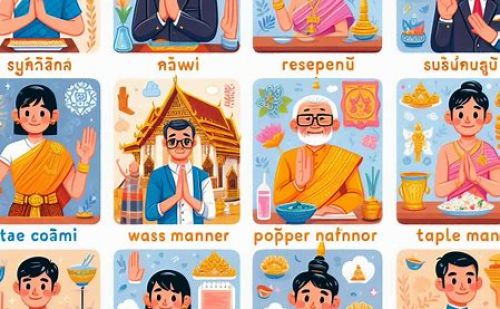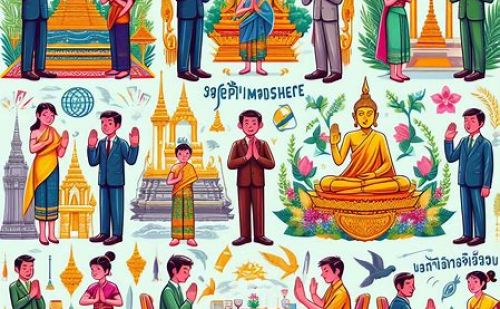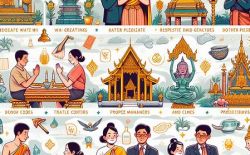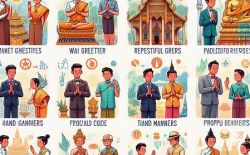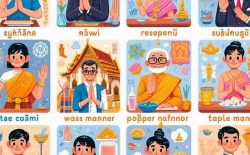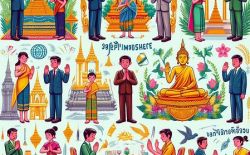Thai etiquette
Thai etiquette
Thai etiquette is the set of rules and customs that govern how people behave and communicate in Thailand. It is based on respect for elders, status, and the sacred. Some of the most important aspects of Thai etiquette are:
The Wai: This is the traditional Thai greeting, which involves pressing the palms together and bowing the head slightly. The Wai is used to show respect, gratitude, and apology. The level of the Wai depends on the relative age and status of the person you are greeting. Generally, the higher the hands and the lower the head, the more respectful the Wai. You should always return a Wai, except from children, monks, and the royal family.
The head and the feet: The head is considered the most sacred and the feet the most impure part of the body in Thai culture. Therefore, you should never touch someone’s head or hair, even as a friendly gesture. You should also avoid pointing your feet at someone, raising your feet higher than someone’s head, or stepping over people. When sitting on the ground, try to tuck your feet under your body or behind you, so they are not visible. If you accidentally touch someone’s head or feet, apologize with a Wai.
The monarchy: The Thai royal family is revered and respected by the majority of Thais. You should never disrespect the king or any member of the royal family, either verbally or non-verbally. This includes images of the king, such as on currency or statues. Criticizing or insulting the monarchy can result in severe legal consequences, as Thailand has strict lese majeste laws. You should also stand up when the national anthem or the royal anthem is played, such as in cinemas or public events.
The monks: Monks are highly respected in Thailand, as Buddhism is the dominant religion. You should always show deference and courtesy to monks, such as giving up your seat, offering food or donations, or speaking politely. You should never touch a monk, especially if you are a woman, as monks are supposed to avoid physical contact with the opposite sex. If you want to give something to a monk, you should place it on a tray or a cloth, or hand it to a male intermediary. You should also dress modestly and remove your shoes when entering a temple or a sacred site.
What is considered rude in Thailand?
There are many things that are considered rude in Thailand, as the country has a complex and refined culture that values respect, hierarchy, and harmony. Some of the most common things that you should avoid doing in Thailand are:
Touching someone’s head or hair, as the head is the most sacred part of the body
Pointing your feet at someone or something, especially a Buddha image or a royal portrait, as the feet are the most impure part of the body
Disrespecting the monarchy, as the king and the royal family are revered and protected by strict laws
Touching or standing over a monk, especially if you are a woman, as monks are supposed to avoid physical contact with the opposite sex
Raising your voice or losing your temper, as Thais value calmness and politeness
Are you supposed to bow back in Thailand?
Yes, you are supposed to bow back in Thailand, unless the person who bows to you is a child, a monk, or a member of the royal family. The bow is called a Wai (ไหว้), and it is a gesture of respect and gratitude. The Wai is also used to apologize, to say goodbye, and to pray. The level of the Wai depends on the relative age and status of the person you are bowing to. Generally, the higher the hands and the lower the head, the more respectful the Wai. You should always return a Wai, except from children, monks, and the royal family, as they do not have to return Wais. If you are unsure how to Wai, you can follow the example of the person who Wais to you, or simply smile and nod politely. Waiing is an important part of Thai etiquette and culture, and it shows that you appreciate and respect the Thai people.
Do and don'ts in Thailand?
There are many things that you should do and avoid doing in Thailand, as the country has a rich and diverse culture that values respect, harmony, and politeness. Here are some of the most important dos and don’ts in Thailand:
Do take off your shoes before entering a temple, a house, or some traditional restaurants, as this is a sign of cleanliness and respect
Don’t touch anyone’s head or hair, as the head is considered the most sacred part of the body in Thai culture
Do return a Wai, which is the traditional Thai greeting of pressing the palms together and bowing the head slightly, unless the person who Wais to you is a child, a monk, or a member of the royal family
Don’t disrespect the monarchy, as the king and the royal family are revered and protected by strict laws in Thailand. Criticizing or insulting the monarchy can result in severe legal consequences
Do dress modestly and appropriately, especially when visiting sacred places such as temples. You should cover your shoulders and knees, and avoid wearing revealing or tight clothes
Don’t point with your feet or raise your feet higher than someone’s head, as the feet are considered the most impure part of the body in Thai culture. You should also avoid stepping over people or objects, or pointing your feet at a Buddha image or a royal portrait
Do use your right hand when giving or receiving something, as the left hand is associated with toilet functions and considered dirty in Thai culture
Don’t lose your temper or raise your voice, as Thais value calmness and politeness. You should always smile and be courteous, even if you encounter a problem or a misunderstanding
What does Khun in Thai mean?
Khun is a polite word that is used to address someone of the same or higher social status in Thai. It is similar to Mr., Mrs., or Miss in English, but it is not gender-specific. It can also mean “you” in formal speech. Khun is often used with the person’s first name or nickname to show respect and acknowledgment. For example, Khun John, Khun Anna, or Khun Noi. Khun can also be used alone for strangers or acquaintances that you don’t know their names. Khun is an important part of Thai etiquette and culture, and it shows that you appreciate and respect the Thai people.
Do dress properly. Make sure to dress respectively while wandering around the country

